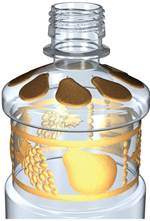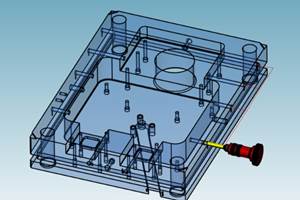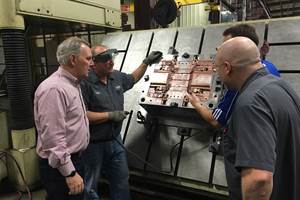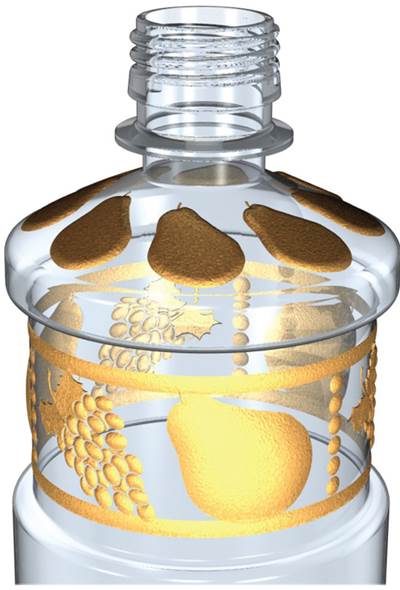CNC Software Delivers 50-Percent Leadtime Reduction for Complex Molds
Industrial Molds considers Delcam’s PowerMILL CNC programming software to be critical to achieving its 8-week average leadtimes.
Industrial Molds Group (Rockford, IL), is a leading manufacturer of precision injection molds and the 2012 winner of MoldMaking Technology’s 2012 Leadtime Leader award. The company’s extensive investment in equipment, technology and employees has enabled it to reduce average leadtimes by 50 percent over the last five years.
Industrial Molds considers Delcam’s PowerMILL CNC programming software to be critical to achieving its 8-week average leadtimes. “PowerMILL reduces our leadtimes in a number of ways,” explains Greg Osborn, Industrial Molds account manager.
Strategy
As customers pushed for faster mold development, Industrial Molds began implementing a strategy to shorten leadtimes. The strategy consisted of buying the best equipment, deploying the best technology, and hiring the best people while keeping their skills up-to-date – a practice the company follows to this day. Deploying the best technology included a switch from previous CNC programming systems to Delcam PowerMILL on the recommendation of its distributor, CAD/CAM Systems.
Control
PowerMILL also provides close control over machining tolerances to make sure that the machined parts meet the spec. “The tighter the tolerance, the longer it takes to generate the toolpath,” says Hastings. “We can loosen it up while we are roughing, which generates the toolpath quicker, then tighten it up for finishing. Because we can control the accuracy, we can achieve close tolerances without sacrificing speed.”
Automation
PowerMILL features, which save programming time, are another factor that contributed to Industrial Molds’ rapid mold development process. One such feature is the software’s openness, which allows for the creation of macros that automate repetitive tasks. For example, one macro performs multiple collision checks and multiple gouge checks. “I select all my toolpaths, and gouge check and collision check on multiple toolpaths at one time,” explains Hastings. “There’s a lot of automation built into PowerMILL and we run a lot of macros for carbon cutting of electrodes.”
Faster Cutting
The third way PowerMILL speeds mold development at Industrial Molds is by reducing machining time. “PowerMILL’s support for arc fitting allows us to take advantage of high-speed, high-feed cutters,” Osborn explains. “When you use software that doesn't allow you to arc fit the toolpath, you have to slow the machine way down to make corners. High-speed cutters can go 300 inches/minute, but if tools have to slow down for corners, they won’t reach that speed. PowerMILL offers smoothing and arc fit, which lets it travel smoothly around corners at much faster speeds. By smoothing out the transitions, PowerMILL allows for faster cutting while maintaining accuracy.”
Covering All Bases
Because Industrial Molds serves customers in such a wide range of industries, the breadth of functionality in PowerMILL is another key advantage. “Every part we cut, from hardened steel to soft aluminum or graphite, we program differently,” states Osborn. “PowerMILL covers all those bases. It isn’t limited to one type of machining. Some components we cut from outside in and others from the inside out. With PowerMILL, the programmer has so much control.”
Customer-Driven Advancements
Finally, Industrial Molds appreciates the fact that Delcam keeps PowerMILL state-of-the art and listens to its users. “They stay up with technology – using 64-bit software is a good example,” Osborn says. “And they are continually developing features to speed up our job and make things more efficient, such as performing the processing in the background so you can use the computer to do other things. We request functionality and Delcam adds it.”
For More Information:
Industrial Molds
(815) 397-2971
industrialmolds.com/
Related Content
Mold Innovations Power Unique Auto Lighting Elements on Hummer EVs
Diamond machining, electroforming of micro-optical inserts and modified latch-lock system help injection molds produce unique forward lighting elements.
Read MoreCAM Automation Increases Mold Production, Quality
Mold builder switches CAM software package after 20 years to take advantage of innovative programming strategies that reduce mold machining programming and processing times.
Read MoreHow to Select a Mold Temperature Controller
White paper shares how cooling channel analysis, which collects maximum pressure drop, total flow rate and heat dissipation, eases the performance evaluation of mold temperature controllers.
Read MoreOEE Monitoring System Addresses Root Cause of Machine Downtime
Unique sensor and patent-pending algorithm of the Amper machine analytics system measures current draw to quickly and inexpensively inform manufacturers which machines are down and why.
Read MoreRead Next
Tribrid Modeling for Mold Manufacture
Moldmakers can benefit from tribrid modeling—a design approach developed by adding triangle modeling to the combination of surface and solid modeling currently in many CAD packages.
Read MoreReasons to Use Fiber Lasers for Mold Cleaning
Fiber lasers offer a simplicity, speed, control and portability, minimizing mold cleaning risks.
Read MoreHow to Use Strategic Planning Tools, Data to Manage the Human Side of Business
Q&A with Marion Wells, MMT EAB member and founder of Human Asset Management.
Read More






.jpg;maxWidth=300;quality=90)








_300x250 3.png;maxWidth=300;quality=90)












